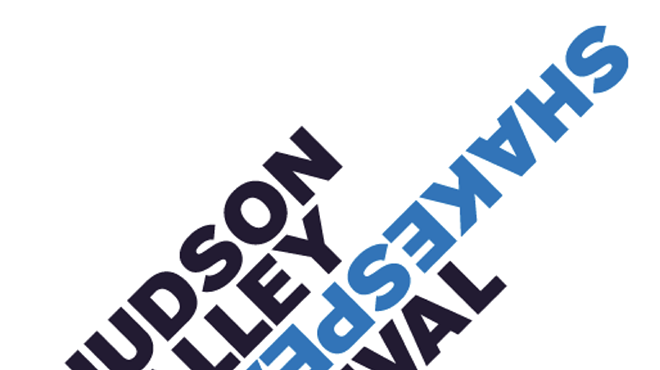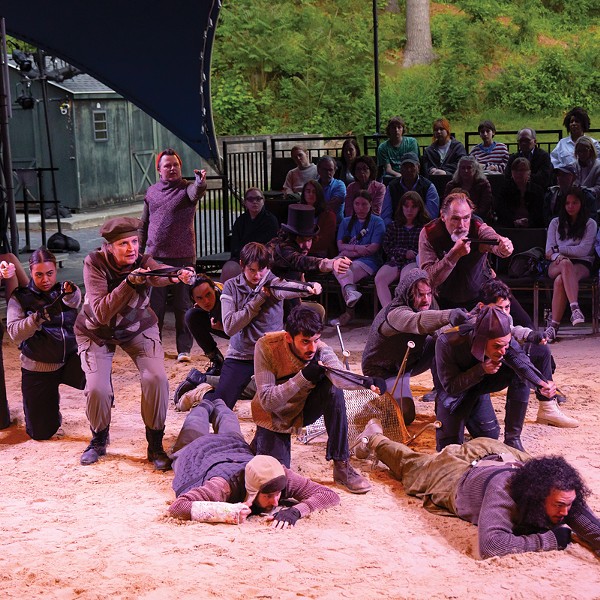Men go off to war. Women wait. At least that's the way it was done in 8th Century BCE Greece when Homer first composed “The Odyssey.” What do we know about those women who wait? Precious little. And that’s something that Hudson Valley Shakespeare Festival’s newest production, “Penelope,” strives to rectify. The world premiere of this new musical theater piece took place on September 3, and the show is currently running through September 17 under the festival tent in Garrison.
“Penelope,” with music and lyrics by Alex Bechtel, and book by Alex Bechtel, Grace McLean, and Eva Steinmetz, is a creative re-imaging of the Odysseus story, as told from the perspective of the long-suffering wife. Served up as a one-woman musical starring Tatiana Wechsler, backed by a five-piece ensemble, Steinmetz, who also directs, shifts the focus from the men of action (or maybe it’s inaction?) to the woman central to it all—Penelope.
The story: The Trojan War has ended after 10 years, and yet a further 10 years have passed and still Odysseus has not returned home. This slow, relentless, passage of time is cleverly demonstrated as Penelope takes the stage, alone, and intones a litany of words that drop like the ticking of a clock, accompanied by simple chords played on piano by Wechsler. One by one, the rest of the musicians join her on stage, as Penelope leaves the piano, and begins her deliberate revolution around the players’ space, an oversize bass drum pulsing a slow heartbeat as the lighting reveals a breaking dawn. Clearly, an eon of dawns have come and gone as Penelope muses, “I could wait for you forever, if you told me what forever was for.”
In the second musical number, the mood shifts and takes on a more self-aware, tongue-in-cheek approach as Penelope pours herself a scotch, and gets down to “some tasteful exposition.” She gives us the whole backstory of Helen, the Trojan War, and what it was like for her being a young wife and new mother, and finding herself abandoned by her husband. For. Twenty. Years. The song has a “Ladies Who Lunch” Sondheim vibe—“He’s Odysseus; she’s Penelope. Drink!”—which lets us know we’re going to be looking at this whole affair through a modern lens.

Each song, as we progress through the show, evokes a different genre from Motown to jazz to folk rock—a delightful melange, delivered by excellent musicians who capture the flavor of each song with subtle nuance and skill. We get a few more songs of her “what if-ing?” We get a comical interaction between her and the goddess Athena, whose repetitive invocation, “Penelope, wife of mighty Odysseus,” finally has Wechsler blurting out, “Penelope! Penelope is enough!” There’s a song about an imaginary stranger and a romantic interlude where she sings, “Be kind to me—Penelope,” and we understand that she is not only imploring as the mysterious lover, but speaking as herself to herself.
Penelope gives us the dirt on the suitors who have set up shop in her home, waiting for her to choose one of them to be her new husband. Monsters, she calls them, and describes all their undesirable traits. She holds them off with the explanation that she must first finish her weaving, and then tells the audience that she weaves all day, and then unravels it all at night. She speaks about how she can create whatever she wants in the sanctuary of her bedroom where she sits at her loom, alone, day after day. “I can weave whatever I want. Go wherever I want, as long as I never finish. As long as I always come back.”
And here is where we come to understand Penelope a little better. She is trapped by futility. She dreams of an adventure, but she can never leave. She has been defined as a wife, yet she has no husband. And most importantly, she’s not really sure who she is, or what she wants, but she knows she wants something more. Wechsler humanizes what, in the original source material, is a somewhat one-dimensional character. Her portrayal and nonverbal performance choices show us how Penelope has grown from a young woman who waits, with no agency, for things to happen around her, to a confident and forceful woman on the verge of recognizing her actual strength, ready to take action. Wechsler shows us why Penelope dares to become more herself, and less “Odysseus’s wife.”
We know that Odysseus eventually returns. What we don’t know is whether our Penelope has grown and changed enough to meet him as that powerful woman who has found her voice, or if she will greet the returning hero as the meek bride he left behind. That's what’s exciting about this show. Each musical number holds us on the tense precipice of Penelope’s “what ifs?” and until the final note, we’re not sure if her resolve will hold.
“Penelope” will be performed through September17. Shows daily, except Monday, at 7pm. Saturday and Sunday matinee at 2pm. Hudson Valley Shakespeare Festival is located at 2015 Route 9 in Garrison. The show's run time is 75 minutes with no intermission.


















